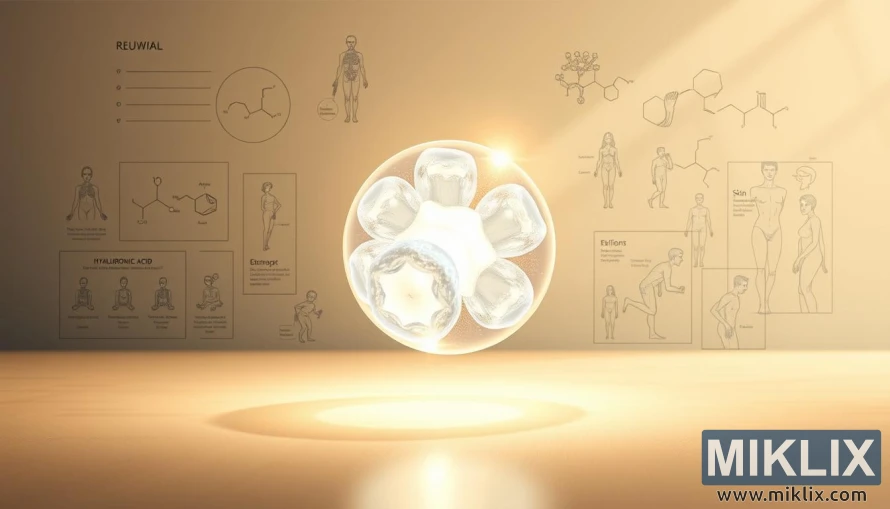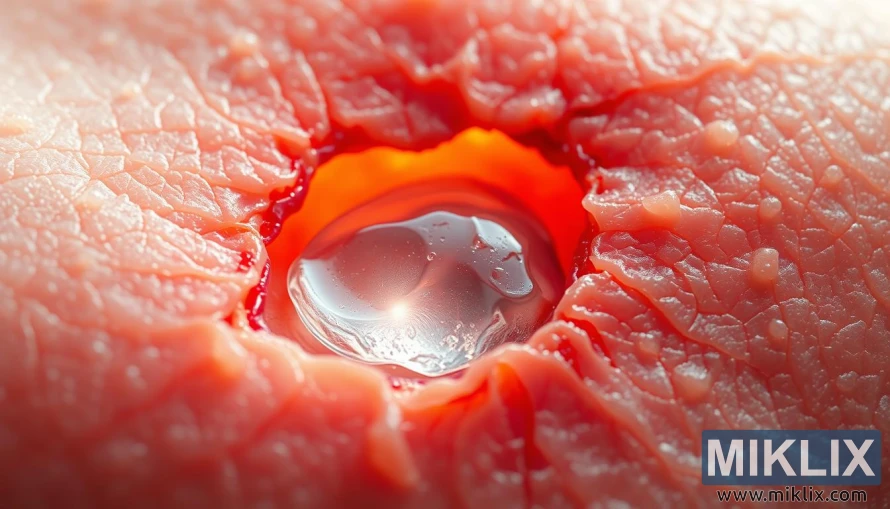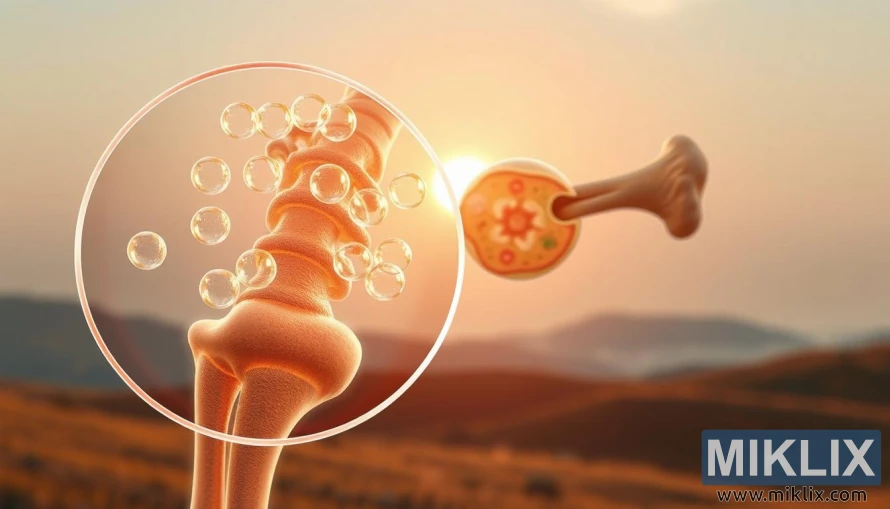Hydrate, Heal, Glow: Unlocking the Benefits of Hyaluronic Acid Supplements
Published: June 30, 2025 at 1:56:52 PM UTC
Hyaluronic acid (HA) is a remarkable substance naturally produced by the body. It's celebrated for its ability to retain moisture and promote overall wellness. As we age, the levels of hyaluronic acid in our bodies can decline. This decline leads to dryness in skin and joints. This article delves into the numerous hyaluronic acid benefits. It highlights the significance of hyaluronic acid supplements in boosting skin health, joint health, and overall vitality. Explore the powerful effects of this versatile compound. Discover how it can play a critical role in your health regimen.

Key Takeaways
- Hyaluronic acid can significantly boost skin hydration and elasticity.
- Supplements can help alleviate joint pain and improve mobility.
- Hyaluronic acid plays an essential role in wound healing.
- It can support eye health by providing lubrication and moisture.
- Incorporating hyaluronic acid into your diet can promote gut health.
Introduction to Hyaluronic Acid
Hyaluronic acid is a clear, gooey substance naturally produced in the human body. It is mainly found in skin, connective tissues, and eyes. This compound is vital for retaining moisture, lubricating tissues, and supporting various body systems. Knowing about hyaluronic acid and its roles is key for those interested in its benefits.
The main functions of hyaluronic acid include:
- Retaining water and keeping tissues hydrated
- Providing lubrication for joints and connective tissues
- Contributing to skin elasticity and overall appearance
- Playing a role in eye health by maintaining moisture levels
Understanding these purposes shows the wide-ranging benefits of hyaluronic acid, mainly when used as a supplement. By delving into these aspects, people can see how supplementation can boost their health and wellness.
What is Hyaluronic Acid?
Hyaluronic acid is a naturally occurring substance in the body, known for its ability to retain moisture. It is part of a family of long-chain polymers that can hold a lot of water. For instance, a small amount of it can hold about one and a half gallons of water. This is due to its hydrophilic (water-attracting) properties.
This compound plays a vital role in various biological functions, such as tissue hydration and lubrication. It is synthesized in connective tissues, skin, and even synovial fluid found in joints. Beyond its natural production, hyaluronic acid can also be produced artificially through bacterial fermentation. This makes it suitable for use in supplements and topical treatments.
How Hyaluronic Acid Works in the Body
Hyaluronic acid is vital for various body functions, mainly by holding onto water molecules. This hyaluronic acid function boosts hydration in the skin and other tissues. It keeps them moist and supple.
It also helps in moving vital molecules around the body. This is key for delivering medicines effectively, helping treat many health issues.
Its structure supports tissue growth and repair. It aids in cell movement and growth, essential for healing wounds. This highlights its role in maintaining body balance.

Hyaluronic acid is essential for skin hydration and supports critical body processes. It's a key player in human health, drawing interest in medicine and wellness.
Hyaluronic Acid for Skin Health
Hyaluronic acid is a key player in skincare, known for its hyaluronic acid skin benefits. It acts as a powerful humectant, drawing moisture into the skin. This makes it look plump and revitalized. People looking to improve their skin's texture often see a significant increase in elasticity after using it.
The anti-aging effects of hyaluronic acid are also noteworthy. It helps reduce the appearance of fine lines and wrinkles, leading to smoother skin. Regular use of products with hyaluronic acid boosts the skin's resilience against environmental stressors, adding an extra layer of protection.
In conclusion, using hyaluronic acid supplements or topical products can greatly improve skin health. It addresses dehydration and aging concerns. Many people experience a refreshed complexion that looks vibrant and full of life.
Benefits of Hyaluronic Acid for Joint Health
Hyaluronic acid is vital for joint health, mainly for those with osteoarthritis. It mainly aids in joint lubrication. This is key for keeping joints mobile and reducing pain.
Research shows that hyaluronic acid supplements can lessen knee pain and boost function in the elderly. Injecting it into joints also offers long-lasting pain relief and improves joint function.
The benefits of hyaluronic acid for joints go beyond just pain relief. It helps keep cartilage healthy and supports better movement. Adding hyaluronic acid to your health routine can greatly benefit those with joint pain from osteoarthritis.
Hyaluronic Acid and Wound Healing
Hyaluronic acid is vital for wound healing, thanks to its ability to manage inflammation and boost skin regeneration. It's present in higher amounts at wound sites, supporting the body's healing efforts. Studies show that applying hyaluronic acid can speed up healing and shrink wound sizes, leading to better recovery results.
One key benefit of hyaluronic acid in wound healing is its antibacterial properties. These properties help prevent infections, a major concern during healing. Hyaluronic acid keeps the wound moist and forms a protective barrier, safeguarding against pathogens.
The advantages of using hyaluronic acid in clinical settings include:
- Accelerating tissue repair.
- Minimizing inflammation.
- Enhancing skin regeneration.
In summary, hyaluronic acid in wound care treatments is a significant advancement. It offers benefits that go beyond basic healing.

Hyaluronic Acid for Eye Health
Hyaluronic acid is key in supporting eye health due to its moisture retention ability. Dry eyes, often caused by screen time, environmental factors, and aging, are common. Hyaluronic acid eye drops offer relief by lubricating the eyes and restoring moisture.
During surgeries, hyaluronic acid is vital for reducing inflammation and aiding in healing. Its viscoelastic properties create a protective barrier, facilitating a smoother recovery. As the importance of eye health grows, using hyaluronic acid in eye care is becoming more common.
The Role of Hyaluronic Acid in Gut Health
Recent studies suggest that hyaluronic acid could play a significant role in gut health. This naturally occurring substance may offer benefits for digestive health, mainly for those with acid reflux. It appears to aid the esophagus by promoting the healing of its lining, which can be damaged by excessive acid.
Adding hyaluronic acid supplements to your daily routine could improve gut health in several ways:
- It speeds up the recovery of damaged tissue in the digestive tract.
- It reduces symptoms of acid reflux.
- It helps maintain the right moisture balance in the gastrointestinal system.
As research on hyaluronic acid deepens, its benefits for digestive health look promising. It offers a new approach to managing gut-related issues.
Impact of Hyaluronic Acid on Bone Strength
Recent studies suggest hyaluronic acid could significantly boost bone health. Known for its benefits in skin and joint care, it's now being explored for its bone-strengthening properties. Research points to its role in preventing bone loss and promoting new bone formation. This has sparked hope for its use in fighting osteoporosis.
Osteoporosis weakens bones, increasing fracture risk. Adding hyaluronic acid to treatments might offer a new way to enhance bone density and skeletal health. Further research is needed to grasp how hyaluronic acid influences bone health and its exact mechanisms.

Hyaluronic Acid and Bladder Pain Relief
Hyaluronic acid is being explored for its role in easing bladder pain, often seen in interstitial cystitis. This condition causes persistent pain, urgency, and frequent need to urinate, leading to significant distress.
Studies suggest that using hyaluronic acid directly in the bladder can help reduce pain and frequency of urination. This method, known as intravesical treatment, delivers the acid right to the source of pain. It has been shown to improve bladder health by strengthening the bladder walls and lowering inflammation.
The effectiveness of taking hyaluronic acid orally for bladder pain is less established. While some people report positive effects, the scientific community is not yet fully convinced. Those looking to try supplements for urinary health should first talk to a doctor for personalized guidance.
In conclusion, research into hyaluronic acid for interstitial cystitis treatment holds promise for those with bladder pain. It offers a glimmer of hope through both direct bladder treatments and ongoing research. It's essential to understand how each person reacts to treatment to achieve the best results.
Hyaluronic Acid Foods for Natural Supplementation
Incorporating hyaluronic acid foods into your diet can naturally boost your body's levels. Certain foods are key in supporting the production of this vital substance. They enhance your overall nutrition and wellness.
Common sources of hyaluronic acid include:
- Bone broth, rich in collagen and gelatin, offers a significant amount of hyaluronic acid.
- Sweet potatoes are packed with antioxidants and contribute to hyaluronic acid production.
- Beans, including black beans and kidney beans, are beneficial for maintaining healthy connective tissues.
- Garlic contains compounds that assist in the synthesis of hyaluronic acid, making it a flavorful addition to your meals.
Choosing these hyaluronic acid foods offers an affordable alternative to supplements. By focusing on balanced nutrition, you can enhance your body's natural production of hyaluronic acid. This leads to various health benefits.
Forms of Hyaluronic Acid Supplements
Hyaluronic acid supplements are available in several forms, catering to different preferences. You can find them in capsules, tablets, and powders, each with its own advantages. For those who find it easier, powders can be dissolved in water or other drinks. This makes taking hyaluronic acid supplements a more enjoyable experience.
There are also topical forms like serums that allow direct application to the skin. This method targets specific areas, boosting hydration and skin texture. Whether you're looking for oral or topical options, there's a form of hyaluronic acid supplement to meet your needs. This ensures everyone can find a product that fits their health and beauty goals.
Safety and Side Effects of Hyaluronic Acid Supplements
Hyaluronic acid supplements are generally considered safe. Most individuals find them tolerable, with few serious side effects. Some might experience minor allergic reactions or discomfort, often at injection sites. It's important to understand these possible side effects before starting supplementation.
It's wise to take precautions before starting hyaluronic acid supplements, even more so for those with certain medical conditions. Individuals with conditions like cancer should get advice from healthcare providers. This ensures they receive personalized care and addresses any health concerns that might impact safety.
It's vital to monitor your body's response after starting supplementation. Be alert to any unexpected reactions and seek medical advice if side effects occur. This proactive approach helps ensure a safer experience while enjoying the benefits of hyaluronic acid.
Combining Hyaluronic Acid with Other Treatments
Integrating hyaluronic acid with other treatments can enhance their overall benefits. For instance, using hyaluronic acid and treatments like retinol provides moisture while maximizing the efficacy of anti-aging properties. This combination minimizes the discomfort or irritation commonly associated with retinol use.
Current research highlights the synergistic effects of combining hyaluronic acid with therapies for joint and ocular health. Ongoing studies explore how these combinations can improve outcomes. They showcase the versatility of hyaluronic acid beyond simple supplementation.
Scientific Research on Hyaluronic Acid Effectiveness
The scientific community's understanding of hyaluronic acid's benefits is growing rapidly. Recent research emphasizes its importance in maintaining skin hydration, reducing wrinkles, and boosting overall skin health. It also plays a significant role in treating joint pain and aiding in recovery.
Clinical trials have shown promising results, indicating that hyaluronic acid may improve joint function, mainly in those with osteoarthritis. Ongoing research seeks to solidify these findings and uncover new uses in healthcare.

Further studies could reveal even more benefits of hyaluronic acid, extending beyond skincare and joint care. Its effects on gut health and eye care are areas of interest, suggesting a need for more research. The variety of its benefits continues to fuel a vibrant field of scientific investigation.
The Future of Hyaluronic Acid in Health and Wellness
Research into hyaluronic acid is revealing its vast applications in health and wellness. It's being studied for various treatments, moving beyond traditional uses like skincare and joint health. Now, it's also being explored for gut health and managing chronic pain.
People are looking for natural solutions that fit into their wellness routines. Hyaluronic acid's moisture retention and support for bodily functions resonate with the holistic health movement. As research advances, the possibilities for using hyaluronic acid in new treatments are growing. Experts are optimistic about its role in boosting overall health and tackling specific health issues.
Conclusion
Hyaluronic acid offers a wide range of health benefits, from better skin hydration to improved joint health. Its uses cover various health areas, including gut and eye health. This makes hyaluronic acid a key component in modern health and wellness routines.
Research on hyaluronic acid is growing, opening up new uses for it. Studies show its effectiveness, highlighting its importance in health management. Hyaluronic acid is not just for beauty; it's also a therapeutic agent for many health issues.
Understanding the benefits of hyaluronic acid shows its value in our daily lives. Whether through supplements or food, adding hyaluronic acid to our routines can boost our well-being. As we learn more, we can use hyaluronic acid to improve our health.
Further Reading
If you enjoyed this post, you may also like these suggestions:
- Mood, Motivation, Metabolism: Why Tyrosine Deserves a Spot in Your Supplement Stack
- Slim, Green, and Full of Power: The Health Benefits of Leeks
- Omega Gold: Health Benefits of Eating Salmon Regularly
